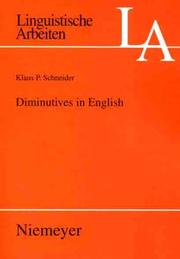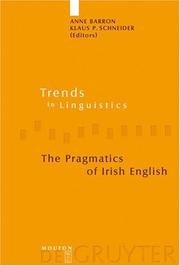| Listing 1 - 10 of 30 | << page >> |
Sort by
|

ISBN: 3110929554 3484304790 3111882527 9783110929553 9783484304796 Year: 2003 Volume: 479 Publisher: Tübingen Niemeyer
Abstract | Keywords | Export | Availability | Bookmark
 Loading...
Loading...Choose an application
- Reference Manager
- EndNote
- RefWorks (Direct export to RefWorks)
That English has no diminutives is a common myth. The present study shows, however, that English does possess diminutives, and not only analytic but also synthetic diminutive markers. Analytic markers include, first and foremost, little, as well as other adjectives from the same word field, whereas the inventory of synthetic markers comprises suffixes as, for instance, -ie, -ette, -let, -kin, -een, -s, -er, -poo and -pegs. These markers are examined from a grammatical and a pragmatic perspective in an integrative formal-functional framework. The grammatical perspective involves phonological, morphological and semantic features, while the pragmatic perspective involves pragmalinguistic as well as sociopragmatic features on the levels of the speech act and larger interactive units in dialogue. The findings reveal that English diminutive suffixes are, in fact, among the most productive suffixes of the English language. While the suffixes share a number of features, each has developed its own profile, specifically regarding semantic and pragmatic features. In everyday conversation, there is a division of labour between the synthetic and the analytic type of formation concerning the communicative functions of diminutives and their distribution in discourse. The choice of formal device and its function depend crucially on pragmatic factors, notably on the illocution, the interactive status, the realisation strategy, and the politeness value of the utterances in which diminutives are employed, and also on the relationship between the interlocutors.
English language -- Diminutives. --- English language --- English --- Languages & Literatures --- English Language --- Diminutives --- Diminutives. --- 802.0-56 --- 802.0-56 Engels: syntaxis; semantiek --- Engels: syntaxis; semantiek --- Germanic languages
Book
ISBN: 3925944109 Year: 1988 Publisher: Marburg Hitzeroth
Abstract | Keywords | Export | Availability | Bookmark
 Loading...
Loading...Choose an application
- Reference Manager
- EndNote
- RefWorks (Direct export to RefWorks)
Conversation --- Discourse analysis. --- Oral communication --- #SBIB:309H040 --- #SBIB:309H511 --- #SBIB:309H514 --- Talking --- Colloquial language --- Etiquette --- Discourse grammar --- Text grammar --- Semantics --- Semiotics --- Oral transmission --- Speech communication --- Verbal communication --- Communication --- Populaire cultuur algemeen --- Verbale communicatie: algemene pragmatiek, stilistiek en teksttheorie, discoursanalyse --- Linguistiek --- Pragmatics --- Discourse analysis
Digital
ISBN: 9783110929553 9783484304796 Year: 2012 Publisher: Tübingen Max Niemeyer Verlag
Abstract | Keywords | Export | Availability | Bookmark
 Loading...
Loading...Choose an application
- Reference Manager
- EndNote
- RefWorks (Direct export to RefWorks)

ISBN: 3110184699 3110898934 9783110898934 9783110184693 Year: 2005 Volume: 164 Publisher: Berlin Mouton de Gruyter
Abstract | Keywords | Export | Availability | Bookmark
 Loading...
Loading...Choose an application
- Reference Manager
- EndNote
- RefWorks (Direct export to RefWorks)
Irish English, while having been the focus of investigations on a variety of linguistic levels, reveals a dearth of research on the pragmatic level. In the present volume, this imbalance is addressed by providing much-needed empirical data on language use in Ireland in the private, official and public spheres and also by examining the use of Irish English as a reflection of socio-cultural norms of interaction. The contributions cover a wide range of pragmatic phenomena and draw on a number of frameworks of analysis. Despite the wide scope of topics and methodologies, a relatively coherent picture of conventions of language use in Ireland emerges. Indirectness and heterogeneity on the formal level are, for instance, shown to be features of Irish English. This volume is the first book-length treatment of the pragmatics of a national variety of English, or any other language. Indeed, it could be considered a first step towards a new discipline, variational pragmatics, at the interface of pragmatics and dialectology. This book is of primary interest to researchers and students in pragmatics, variational linguistics, Irish English, English as Foreign Language (EFL), cross-cultural communication and discourse analysis. Furthermore, the pragmatic descriptions provided will be of practical use in the increasingly important English as Second Language (ESL) context in Ireland. Finally, it is also of relevance to professionals dealing with Ireland and, indeed, to anyone interested in a deeper understanding of Irish culture.
Sociolinguistics --- Pragmatics --- English language --- Dialectology --- Ireland --- Pragmatics. --- Anglais (Langue) --- Pragmatique --- Discourse analysis. --- Social aspects --- Variation --- Analyse du discours --- Aspect social --- Pragmalinguistics --- General semantics --- Language and languages --- Logic, Symbolic and mathematical --- Semantics (Philosophy) --- Germanic languages --- Philosophy --- English /language. --- Sociolinguistics. --- dialectology. --- discourse analysis. --- pragmatics (language).
Book
ISBN: 9789027254221 Year: 2008 Publisher: Amsterdam Benjamins
Abstract | Keywords | Export | Availability | Bookmark
 Loading...
Loading...Choose an application
- Reference Manager
- EndNote
- RefWorks (Direct export to RefWorks)
Pragmatics --- Dialectology --- Language and languages --- Pragmatics. --- Variation. --- Pragmalinguistics --- General semantics --- Logic, Symbolic and mathematical --- Semantics (Philosophy) --- Characterology of speech --- Language diversity --- Language subsystems --- Language variation --- Linguistic diversity --- Variation in language --- Variation --- Philosophy
Book
ISBN: 9783110214390 3110214393 3110214407 3111738531 3110375028 9783110375022 9783110214406 Year: 2014 Publisher: Berlin de Gruyter Mouton
Abstract | Keywords | Export | Availability | Bookmark
 Loading...
Loading...Choose an application
- Reference Manager
- EndNote
- RefWorks (Direct export to RefWorks)
Discourse is language as it occurs, in any form or context, beyond the speech act. It may be written or spoken, monological or dialogical, but there is always a communicative aim or purpose. The present volume provides systematic orientation in the vast field of studying discourse from a pragmatic perspective. It first gives an overview of a range of approaches developed for the analysis of discourse, including, among others, conversation analysis, systemic-functional analysis, genre analysis, critical discourse analysis, corpus-driven approaches and multimodal analysis. The focus is furthermore on functional units in discourse, such as discourse markers, moves, speech act sequences, discourse phases and silence. The final section of the volume examines discourse types and domains, providing a taxonomy of discourse types and focusing on a range of discourse domains, e.g. classroom discourse, medical discourse, legal discourse, electronic discourse. Each article surveys the current state of the art of the respective topic area while also presenting new research findings.
Discourse analysis --- Conversation analysis. --- Discourse markers. --- Pragmatics. --- Pragmatik. --- Pragmatics --- Social aspects. --- Pragmalinguistics --- Discourse connectives --- Discourse particles --- Pragmatic markers --- Pragmatic particles --- Analysis of conversation --- CA (Interpersonal communication) --- Conversational analysis --- General semantics --- Language and languages --- Logic, Symbolic and mathematical --- Semantics (Philosophy) --- Oral communication --- Philosophy --- Discourse analysis - Social aspects --- Conversation analysis --- Discourse markers --- Applied Linguistics, Pragmatics, Discourse Linguistic.
Book
ISBN: 1282105752 9786612105753 9027290504 9789027290502 9781282105751 9789027254221 9027254222 6612105755 Year: 2008 Publisher: Amsterdam Philadelphia John Benjamins
Abstract | Keywords | Export | Availability | Bookmark
 Loading...
Loading...Choose an application
- Reference Manager
- EndNote
- RefWorks (Direct export to RefWorks)
Pragmatics. --- Language and languages --- Characterology of speech --- Language diversity --- Language subsystems --- Language variation --- Linguistic diversity --- Variation in language --- Pragmalinguistics --- General semantics --- Logic, Symbolic and mathematical --- Semantics (Philosophy) --- Variation. --- Philosophy
Book
ISBN: 9783732905690 Year: 2020 Publisher: Berlin : Frank & Timme, Verlag für wissenschaftliche Literatur,
Abstract | Keywords | Export | Availability | Bookmark
 Loading...
Loading...Choose an application
- Reference Manager
- EndNote
- RefWorks (Direct export to RefWorks)
Book
ISBN: 9004466398 9004465650 Year: 2022 Publisher: Leiden, The Netherlands : Koninklijke Brill nv,
Abstract | Keywords | Export | Availability | Bookmark
 Loading...
Loading...Choose an application
- Reference Manager
- EndNote
- RefWorks (Direct export to RefWorks)
Poverty and precarity are among the most pressing social issues of today and have become a significant thematic focus and analytical tool in the humanities in the last two decades. This volume brings together an international group of scholars who investigate conceptualisations of poverty and precarity from the perspective of literary and cultural studies as well as linguistics. Analysing literature, visual arts and news media from across the postcolonial world, they aim at exploring the frameworks of representation that impact affective and ethical responses to disenfranchised groups and precarious subjects. Case studies focus on intersections between precarity and race, class, and gender, institutional frameworks of publishing, environmental precarity, and the framing of refugees and migrants as precarious subjects. Contributors: Clelia Clini, Geoffrey V. Davis, Dorothee Klein, Sue Kossew, Maryam Mirza, Anna Lienen, Julia Hoydis, Susan Nalugwa Kiguli, Sule Emmanuel Egya, Malcolm Sen, Jan Rupp, J.U. Jacobs, Julian Wacker, Andreas Musolff, Janet M. Wilson
Book
ISBN: 9789004465657 Year: 2022 Publisher: Leiden ; Boston : Brill,
Abstract | Keywords | Export | Availability | Bookmark
 Loading...
Loading...Choose an application
- Reference Manager
- EndNote
- RefWorks (Direct export to RefWorks)
Poverty and precarity are among the most pressing social issues of today and have become a significant thematic focus and analytical tool in the humanities in the last two decades. This volume brings together an international group of scholars who investigate conceptualisations of poverty and precarity from the perspective of literary and cultural studies as well as linguistics. Analysing literature, visual arts and news media from across the postcolonial world, they aim at exploring the frameworks of representation that impact affective and ethical responses to disenfranchised groups and precarious subjects. Case studies focus on intersections between precarity and race, class, and gender, institutional frameworks of publishing, environmental precarity, and the framing of refugees and migrants as precarious subjects. Contributors: Clelia Clini, Geoffrey V. Davis, Dorothee Klein, Sue Kossew, Maryam Mirza, Anna Lienen, Julia Hoydis, Susan Nalugwa Kiguli, Sule Emmanuel Egya, Malcolm Sen, Jan Rupp, J.U. Jacobs, Julian Wacker, Andreas Musolff, Janet M. Wilson.
Poverty in literature --- Human security in literature --- Minorities in literature
| Listing 1 - 10 of 30 | << page >> |
Sort by
|

 Search
Search Feedback
Feedback About UniCat
About UniCat  Help
Help News
News